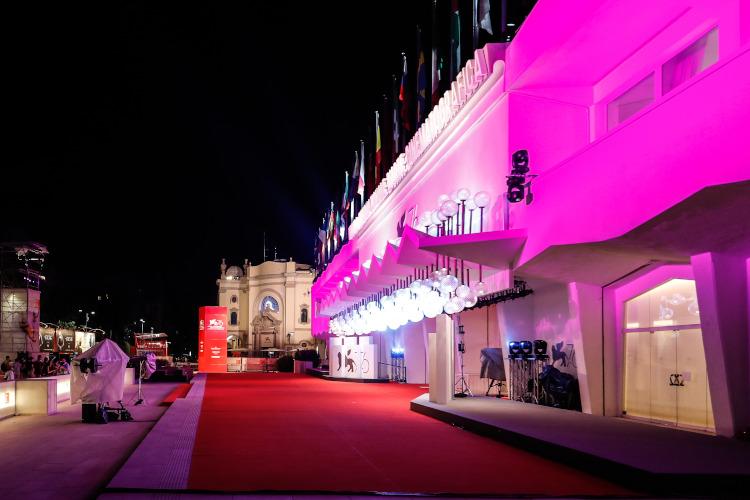Mariangela Gualtieri with the poem nove marzo duemilaventi and Diodato with the song Adesso at the closing night of the 77th Venice International Film Festival, hosted by Anna Foglietta.

The Ceremony will be held on Saturday 12 September at 7:00 pm with Anna Foglietta, the poet Mariangela Gualtieri and the singer-songwriter Diodato.
Mariangela Gualtieri with the poem nove marzo duemilaventi and Diodato with the song Adesso at the closing night of the 77th Venice International Film Festival, hosted by Anna Foglietta.
The Closing Ceremony of the 77th Venice International Film Festival – which will be broadcast live Saturday September 12th starting at 7 pm on the Rai Movie channel, Rai Play and in streaming on the official website and social media of the Biennale di Venezia, hosted by Anna Foglietta (Sala Grande in the Palazzo del Cinema on the Lido), and will award the Golden Lion for Best Film and the other official prizes – will exceptionally be opened by two artistic contributions by poet and playwright Mariangela Gualtieri and by the singer-songwriter Diodato.
In a video filmed especially for the occasion, Mariangela Gualtieri will recite a fragment of nove marzo duemilaventi, the poem that captured Italians at the beginning of the Covid-19 lockdown, and was widely shared on the web and on the social networks. Mariangela Gualtieri’s poetic words have been chosen to inaugurate – on Monday September 14th at the Teatro Goldoni (at 4 pm) – the 48th International Theatre Festival of the Biennale directed by Antonio Latella, with the unpublished Voce che apre, one of her precious sound rituals, immersed in the visual atmosphere created by director Cesare Ronconi.
Live from the stage of the Sala Grande, Diodato will sing a revised version of Adesso, one of the most famous pieces in his repertoire and more relevant today than ever. The piece represents a state of clear and sincere awareness, a determination to feel the present time fully, almost physically. A present that now more than ever impels us to profoundly rethink our everyday lives, time, the ambitions and desires that until recently appeared so solid. It talks about the courage it takes to question ourselves and then to recognize ourselves for who we are, looking at life with an open mind, to perceive its beauty on every occasion.
Mariangela Gualtieri (Cesena, 1951), poet and playwright, began to write within the Teatro Valdoca she herself founded together with director Cesare Ronconi. Her playwriting, always in verse, comes to life during the live rehearsals, in response to the play of forces on stage. From the very beginning she is attentive to the oral rendition of the poem, and the connection between voice, poetic verse and silence. She creates essential Sound Rituals, in which everything is focused on the oral/aural energy of poetry, on its “phonic enchantment”, in the certainty that it is an ancient, current path to understanding and compassion in the world. Writings about theatre: Antenata (ed. Crocetti, 1992), Nei leoni e nei lupi (I Quaderni del Battello Ebbro, 1997), Parsifal (Teatro Valdoca ed., 2000), Chioma (Teatro Valdoca ed., 2000), Fuoco Centrale e altre poesie per il teatro (Einaudi, 2003), Sermone ai cuccioli della mia specie (L’arboreto Editore, 2006; with an audio CD, Teatro Valdoca ed., 2012), Paesaggio con fratello rotto (book and DVD, Luca Sossella Editore, 2007), Caino (Einaudi, 2011), Voci di tenebra azzurra (Stampa 2009 ed., 2016), co-author of L’Album dei Giuramenti/Tavole dei Giuramenti (Quodlibet, 2019) by Teatro Valdoca. Poetry collections: Senza polvere senza peso (Einaudi, 2006), Bestia di gioia (Einaudi, 2010), A Seneghe. Mariangela Gualtieri/Guido Guidi (Perda Sonadora Imprentas, 2012), Le giovani parole (Einaudi, 2015), Beast of Joy. Selected poems (Chelsea Editions, New York, 2018), Quando non morivo (Einaudi, 2019).
Diodato (Antonio Diodato, Aosta 1981), an intense and sophisticated singer-songwriter, one of the most highly appreciated in new Italian pop, made his debut in 2013 with his first album of original songs E forse sono pazzo. His reinterpretation of the song Amore che vieni, amore che vai by Fabrizio de André (which won him the “Premio Fabrizio De André”) was featured in the soundtrack of Daniele Lucchetti’s film Anni felici, presented at the Toronto Film Festival. In February 2014 he participated in the Festival di Sanremo in the “Nuove proposte” section with Babilonia, coming in second. In May he appeared in the First of May Concert in Taranto, later becoming its artistic director with Roy Paci and Michele Riondino. In September 2014 he released the album A ritrovar bellezza. His second album of original songs Cosa siamo diventati was released in 2016. In 2018, with Roy Paci, he returned to Sanremo with the piece Adesso which won the praise of critics and public alike, and was chosen as the soundtrack for Annamaria Loguori’s short film La notte prima, which was previewed at Venezia 75. In February 2020, he won the 70th Festival of Sanremo with Fai Rumore (platinum) along with the Mia Martini critics’ award and the Lucio Dalla web, radio and tv press room award and the Premio Lunezia. On February 14th he released Che vita meravigliosa (Carosello Records), the fourth album of original songs containing the eponymous single, which was featured in the soundtrack of Ozpetek’s film La Dea Fortuna and won the David di Donatello and Nastri d’Argento awards as Best Original Song. In May Diodato represented Italy in the show ‘Europe Shine A Light’, appearing at the Arena in Verona to sing Fai Rumore in a new version, and released the single Un’altra estate which gave its name to the ‘Concerti di un’altra estate’, live events held in extraordinary places across Italy. For the 77th Venice International Film Festival, he will receive the Soundtrack Stars Award Speciale “Musica&Cinema” for his remarkable syntony with the world of cinema and was the first protagonist of the “Special Openings” of the Venice Pavilion, with special guest Ferzan Özpetek, for a dialogue celebrating the bond between music and cinema.